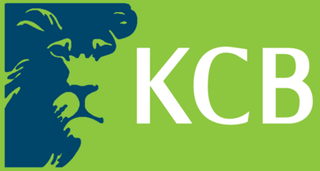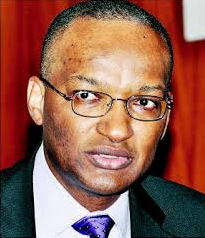Related Research Articles

The economy of Kenya is market-based with a few state enterprises. Kenya has an emerging market and is an averagely industrialised nation ahead of its East African peers. Currently a lower middle income nation, Kenya plans to be a newly industrialised nation by 2030. The major industries driving the Kenyan economy include financial services, agriculture, real estate, manufacturing, logistics, tourism, retail and energy. As of 2020, Kenya had the third largest economy in Sub-Saharan Africa, behind Nigeria and South Africa. Regionally, Kenya has had a stronger and more stable economy compared to its neighboring countries within East Africa. By 2023, the country had become Africa's largest start-up hub by both funds invested and number of projects.

KCB Bank Kenya Limited is a financial services provider headquartered in Nairobi, Kenya. It is licensed as a commercial bank, by the Central Bank of Kenya, the national banking regulator. The bank has also been running Agency banking model.

The shilling is the currency of Kenya. It is divided into 100 cents. The Central Bank of Kenya Act cap 491, mandated the printing and minting of the Kenyan shilling currency.

Corruption in the government of Kenya has a history which spans the era of the founding president Jomo Kenyatta, to Daniel arap Moi's KANU, Mwai Kibaki's PNU governments. President Uhuru Kenyatta's Jubilee Party government, and the current William Ruto's Kenya Kwanza administration has also been riddled with massive cases of graft, topping in the list of corrupt Presidents in Africa

The Central Bank of Kenya (CBK) is the monetary authority of Kenya. Its head office is located in Nairobi. CBK was founded by in 1966 after the dissolution of East African Currency Board (EACB). Dr. Kamau Thugge, CBS is the current Governor and Dr. Susan Koech is the Deputy Governor.

Njuguna S. Ndung'u is a Kenyan economist who is the ex-Minister of Finance in the cabinet of President William Samoei Ruto from October 2022 to July 2024.

Chase Bank Kenya Limited(CBK), commonly referred to as Chase Bank, was a commercial bank in Kenya, licensed by the Central Bank of Kenya, the central bank and national banking regulator.
Sidian Bank, formerly known as K-Rep Bank, is a commercial bank in Kenya, licensed by the Central Bank of Kenya, the national banking regulator.
Housing Finance Company Limited, commonly referred to as Housing Finance, is a commercial bank in Kenya, regulated by the Central Bank of Kenya, the central bank and national banking regulator. HFC is major mortgage lender in Kenya and was the second-largest in the market with KSh33.7 billion in mortgage loans, as of December 2019. At that time, Kenya Commercial Bank, the largest mortgage lender in the country had KSh64.3 billion in mortgage loans.
Victoria Commercial Bank (VCB) is a private bank in Kenya. It is licensed as a commercial bank, by the Central Bank of Kenya, the Central Bank and national banking regulator.

Henry K. Rotich is a Kenyan civil servant who was nominated by President Uhuru Kenyatta as Cabinet Secretary for the National Treasury on 23 April 2013. On 14 January 2020, Rotich, who had been arrested on charges of corruption, was removed from this position.

Urjit Patel is a Kenyan-born Indian economist, who formerly served as the 24th Governor of the Reserve Bank of India and also Deputy Governor of Reserve Bank of India, looking after monetary policy, economic research, financial markets, statistics and information management. He resigned from his post on 10 December 2018, being the first RBI governor to state personal reasons as a driving factor for resigning.

Patrick Ngugi Njoroge is a Kenyan economist, banker and the ninth governor of the Central Bank of Kenya.
The Governor of the Central Bank of Kenya is the chief executive officer of the Central Bank of Kenya. The Governor also serves as a member of the board of directors of the central bank.
Bank of Africa Kenya Limited, is a commercial bank in Kenya. It is one of the commercial banks licensed by Central Bank of Kenya, the country's central bank and the national banking regulator.
Phillip Ndegwa was a Kenyan economist, entrepreneur, former Governor of the Central Bank of Kenya, and patriarch of one of the country's wealthiest families.
Yvonne Mhango is a Malawian economist. She is the economist for Sub-Saharan Africa at Renaissance Capital.
Nancy Asiko Onyango, commonly known as Nancy Onyango, is a Kenyan accountant, businesswoman and corporate executive, who is the Director of the Office of Internal Audit and Inspection at the International Monetary Fund. She was appointed on 4 December 2017, with the appointment to take effect on 1 February 2018. Before her appointment, she served as the CEO of Reliance Risk Advisory Solutions, a Nairobi-based consultancy firm.

Commercial International Bank (CIB) Kenya Limited is a commercial bank in Kenya. It is licensed by the Central Bank of Kenya, the country's central bank and national banking regulator.
References
- 1 2 Brian Ambani (19 June 2023). "Kamau Thugge takes over as Central Bank Governor". Daily Nation . Nairobi, Kenya. Retrieved 19 June 2023.
- 1 2 3 Central Bank of Kenya (19 June 2023). "Appointment of Governor Dr Kamau Thugge" (PDF). Central Bank of Kenya . Nairobi, Kenya. Retrieved 21 June 2023.
- 1 2 Dominic Omondi (22 May 2023). "Kamau Thugge: Adept economist must deal with high-voltage politics to deliver in CBK role". Business Daily Africa . Nairobi, Kenya. Retrieved 21 June 2023.
- ↑ Kepha Muiruri (1 June 2023). "CBK chief differs with Kamau Thugge on issuing local dollar bond". Business Daily Africa . Nairobi, Kenya. Retrieved 21 June 2023.
- ↑ Edwin Mutai (25 October 2023). "Kamau Thugge: Kenya paying the price for overvalued shilling". Business Daily Africa . Nairobi, Kenya. Retrieved 30 October 2023.
- ↑ "Weak shilling to hit Kenyans' pockets harder - People Daily". www.pd.co.ke. 25 October 2023. Retrieved 30 October 2023.
- ↑ Tongola, Mate. "More demand for the dollar to blame for a weakening shilling- Kamau Thugge". The Standard. Retrieved 30 October 2023.